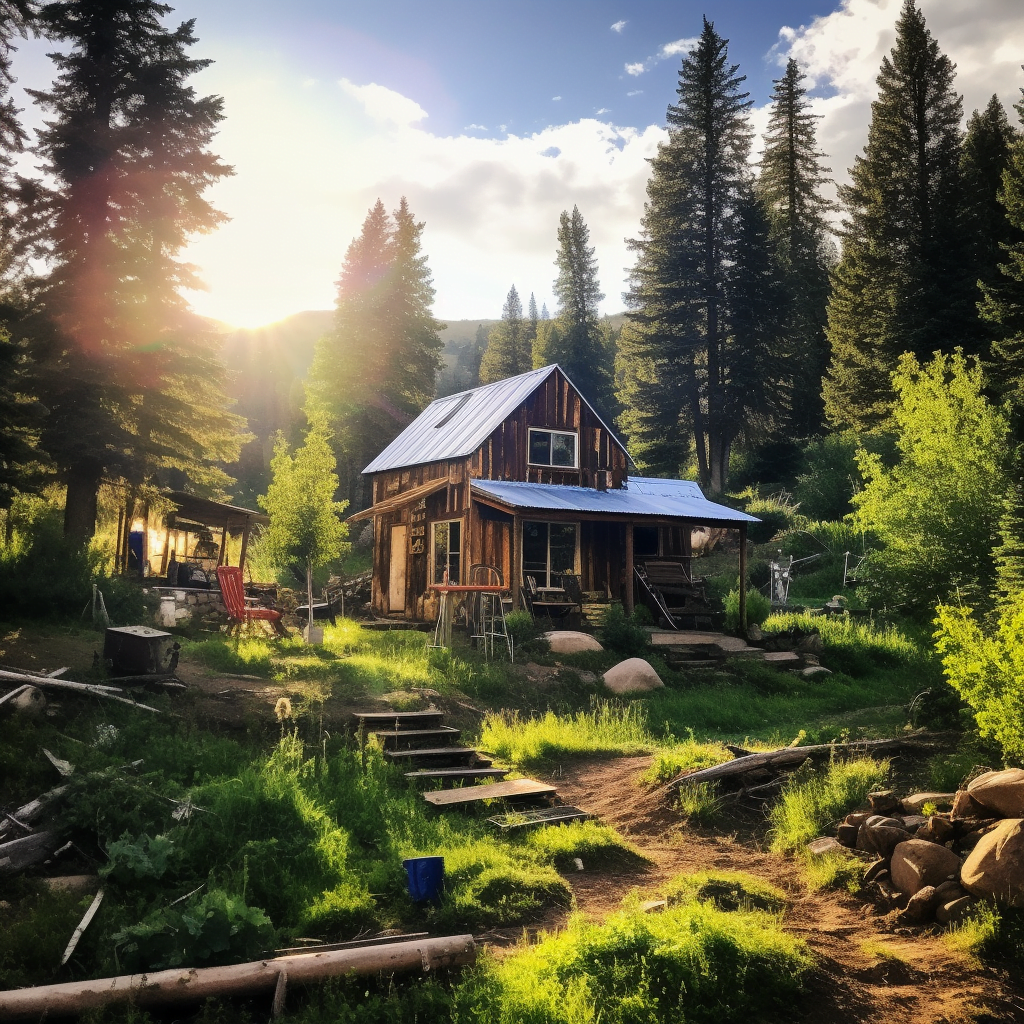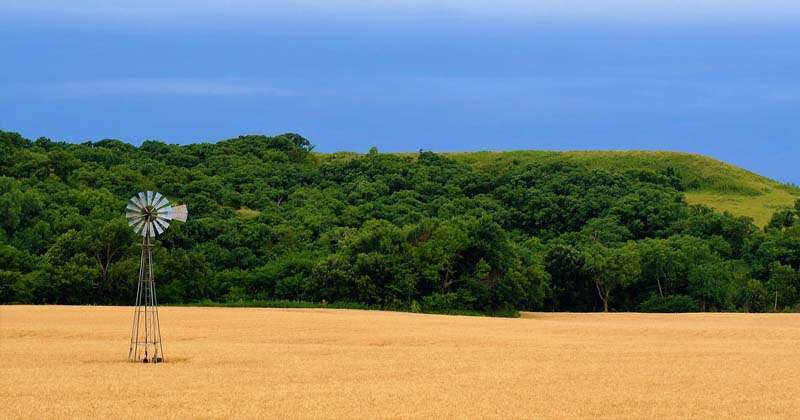Living off the grid can be a liberating lifestyle, but it comes with its own set of challenges. One of the most common concerns for off-gridders is how to handle transportation needs. Without access to public transportation or the convenience of a nearby car dealership, off-gridders have to get creative in finding effective and sustainable ways to get from point A to point B. In this article, I will explore the various strategies and solutions that off-gridders employ to meet their transportation needs while living autonomously and in harmony with the environment.

Public Transportation Options
Urban Areas
In urban areas, there are plenty of public transportation options that can be utilized by off-gridders. One popular mode of transportation is buses. Many cities have well-established bus networks that can easily take you from one place to another within the city. Buses are affordable and convenient, as they have designated stops and schedules that can be easily accessed online or through mobile applications. They also contribute to reducing traffic congestion and air pollution, making them a more sustainable choice.
Another option available in urban areas is light rail systems. These are electric trains that operate within the city and connect different neighborhoods or suburbs. Light rail systems provide a faster and more comfortable form of transportation compared to buses. They can carry a larger number of passengers and run more frequently, offering a reliable and efficient way to travel.
For shorter distances, off-gridders in urban areas can also consider using bicycles as a mode of transportation. Many cities have bike-sharing programs or dedicated bike lanes, making cycling a safe and practical option. Bicycles are not only eco-friendly, but they also help improve physical fitness and can save money on transportation costs. Additionally, electric bicycles are gaining popularity as they provide an extra boost for those who need assistance pedaling uphill or over longer distances.
Rural Areas
Living off-grid in rural areas comes with its own set of challenges when it comes to transportation. However, there are still options available for off-gridders to get around. One common mode of transportation in rural areas is private vehicles, such as cars and trucks. While these vehicles may require fuel, off-gridders can explore alternative fuel options that are environmentally friendly, such as biodiesel or propane-powered vehicles, which we will discuss in more detail later.
In some rural areas, there may be limited public transportation options, such as buses or shuttle services. These services may not run as frequently as in urban areas, but they can still be useful for certain trips, such as commuting to work or accessing essential services. Off-gridders can inquire about these services in their local communities or explore the possibility of starting community-based transportation initiatives to cater to specific needs.
For those who prefer a more sustainable and self-reliant approach, bicycles and pedal-powered transportation are viable options in rural areas as well. Bicycles can be used not only for commuting but also for leisurely rides and exploring the beautiful countryside. Cargo bicycles can also be utilized for transport purposes, allowing off-gridders to carry groceries, supplies, or even small livestock. Electric bicycles can be a great choice for those who require some assistance over hilly terrains or longer distances.
Alternative Fuel Vehicles
Electric Cars
Electric cars have gained significant popularity in recent years due to their eco-friendly nature and the continuous advancements in battery technology. These vehicles are powered entirely by electricity, eliminating the need for gasoline or diesel. Electric cars can be charged at charging stations or even at home using a regular power outlet. This makes them a convenient choice for off-gridders who have access to renewable energy sources, such as solar or wind power. Electric cars emit zero tailpipe emissions, reducing air pollution and carbon footprint significantly.
Although electric cars have a limited range per charge, there have been improvements in battery technology to enhance their mileage. Additionally, rapid charging stations are becoming more prevalent, allowing for quick charging on the go. The availability of public charging stations and the expanding network of electric vehicle infrastructure make electric cars a viable option for off-gridders living in both urban and rural areas.
Hybrid Cars
Hybrid cars combine an internal combustion engine with an electric motor, offering the best of both worlds. These vehicles can operate on both traditional fuel and electricity, allowing for improved fuel efficiency and reduced emissions. Hybrid cars use regenerative braking technology, which converts kinetic energy into electrical energy, charging the batteries while the car is decelerating or braking. This feature makes them ideal for stop-and-go traffic conditions common in urban areas.
For off-gridders, hybrid cars provide versatility in terms of fuel options. They can rely on gasoline or diesel when needed, but also take advantage of the electric motor for shorter distances or when driving in residential areas. The ability to recharge the batteries through regenerative braking or by plugging into a charging station further extends the hybrid car’s range.
Biodiesel Vehicles
Biodiesel vehicles are an excellent alternative for off-gridders seeking a more sustainable fuel option. Biodiesel is made from renewable sources, such as vegetable oils or animal fats, and can be used as a substitute for traditional diesel fuel. Biodiesel can be produced locally, making it a more self-reliant choice for off-gridders.
Biodiesel vehicles require minimal modifications to operate on biodiesel blends. They can use pure biodiesel (B100) or a blend of biodiesel and conventional diesel fuel. Biodiesel vehicles have similar performance characteristics to diesel cars, but they emit fewer greenhouse gases and pollutants, contributing to cleaner air quality. Off-gridders who have access to waste cooking oil or other suitable feedstock can even produce their own biodiesel, minimizing their dependence on external fuel sources.
Propane-powered Vehicles
Propane, also known as liquefied petroleum gas (LPG), is another alternative fuel option that off-gridders can consider for transportation needs. Propane-powered vehicles utilize propane as a fuel source instead of gasoline or diesel. Propane is a byproduct of natural gas processing and crude oil refining, making it a readily available and affordable fuel option.
Propane-powered vehicles offer several advantages, such as lower fuel costs, reduced emissions, and extended engine life. Propane burns cleanly, emitting fewer greenhouse gases and pollutants compared to conventional fuels. Propane refueling infrastructure is also becoming more widespread, making it easier for off-gridders to access fuel stations or even install on-site propane refueling options.

Bicycles and Pedal-Powered Transportation
Cargo Bicycles
Cargo bicycles are specially designed bicycles that are equipped with a large cargo-carrying capacity. They typically have a sturdy frame, wide tires, and sometimes an electric motor to assist with heavy loads or uphill rides. Cargo bicycles are commonly used by businesses for urban deliveries or by individuals for transporting groceries, camping gear, or even children.
For off-gridders, cargo bicycles provide a sustainable and reliable means of transportation for various purposes. Whether it’s hauling firewood, tools, or supplies from one point to another, cargo bicycles offer a cost-effective and eco-friendly option. They are particularly useful in areas with limited vehicle access or strict regulations on motorized transportation. With proper planning and organization, off-gridders can optimize their cargo bicycle usage and reduce the need for conventional vehicles.
Electric Bicycles
Electric bicycles, also known as e-bikes, have gained significant popularity in recent years. These bicycles are equipped with an electric motor that provides assistance to the rider while pedaling. E-bikes come in various designs, ranging from city commuter bikes to mountain bikes. They offer different levels of assistance, allowing riders to choose how much electric power they require or prefer.
Off-gridders can find electric bicycles beneficial, especially in hilly terrains or when covering longer distances. The electric motor assists with pedaling, making it easier to tackle inclines or headwinds. With an e-bike, off-gridders can enjoy the benefits of cycling while reducing physical exertion and arriving at their destination faster. Furthermore, e-bikes can be charged using a regular power outlet, making them compatible with off-grid power systems, such as solar or wind.
Recumbent Bicycles
Recumbent bicycles provide a unique and comfortable riding experience. Unlike traditional bicycles, recumbent bicycles have a reclined seating position, with the pedals positioned in front of the rider. This design offers improved aerodynamics, reduced strain on the back and neck, and a lower center of gravity, enhancing stability.
For off-gridders looking for a different cycling experience, recumbent bicycles can be an excellent choice. They are especially suitable for long-distance rides or touring, as the reclined position reduces fatigue and allows for a more relaxed ride. Recumbent bicycles are available in both manual and electric versions, providing off-gridders with options to suit their preferences and needs.
Motorcycles and Scooters
Electric Motorcycles
Electric motorcycles are gaining popularity as more advancements are made in battery technology. These motorcycles are powered solely by electricity and provide a clean, quiet, and efficient mode of transportation. Electric motorcycles offer similar speed and performance to traditional gasoline motorcycles while eliminating tailpipe emissions and reducing noise pollution.
For off-gridders living in both urban and rural areas, electric motorcycles can be a practical transportation option. They provide flexibility and maneuverability, making them suitable for commuting, running errands, or exploring off-grid trails. With the availability of charging stations and the extended range provided by modern electric motorcycle batteries, the limitations of previous generations of electric motorcycles have been significantly addressed.
Hybrid Motorcycles
Similar to hybrid cars, hybrid motorcycles combine an internal combustion engine with an electric motor. These motorcycles can switch between gasoline and electric power, allowing for improved fuel efficiency and reduced emissions. Hybrid motorcycles use regenerative braking technology to recharge the batteries while decelerating or braking.
For off-gridders who prefer motorcycles, hybrid motorcycles offer the advantage of having both fuel options available. They can rely on traditional gasoline for long rides or when riding on highways, but can also switch to electric power for shorter distances or quieter rides. Hybrid motorcycles provide a balance between performance, fuel efficiency, and environmental consciousness.
Electric Scooters
Electric scooters have gained popularity as a convenient and eco-friendly alternative for urban commuting. These scooters are electrically powered and offer a compact and efficient means of transportation. Electric scooters are lightweight, easy to maneuver, and can often be folded, making them a practical choice for off-gridders with limited space or the need for portability.
In urban areas, electric scooters can easily navigate through traffic and provide a quick and efficient way to reach destinations. They are emission-free, produce no noise pollution, and are often equipped with built-in lights and other safety features. Electric scooters have seen widespread adoption with the rise of ride-sharing programs, providing users with a convenient and sustainable mode of transportation.
Moped Scooters
Moped scooters, also known as motorized bicycles or mopeds, are small, lightweight vehicles that are a combination of a bicycle and a motor scooter. They typically have pedals for manual propulsion, but also feature a small motor to assist with acceleration and climbing hills. Moped scooters are commonly used for short-distance commuting, running errands, or exploring local areas.
For off-gridders in both urban and rural areas, moped scooters can be a versatile and efficient mode of transportation. They offer the convenience of a motorized vehicle while still allowing for manual pedaling when desired. Moped scooters are often equipped with storage compartments, making them suitable for carrying groceries, supplies, or personal belongings. Additionally, their fuel-efficient nature and smaller engine size contribute to reduced fuel consumption and emissions.
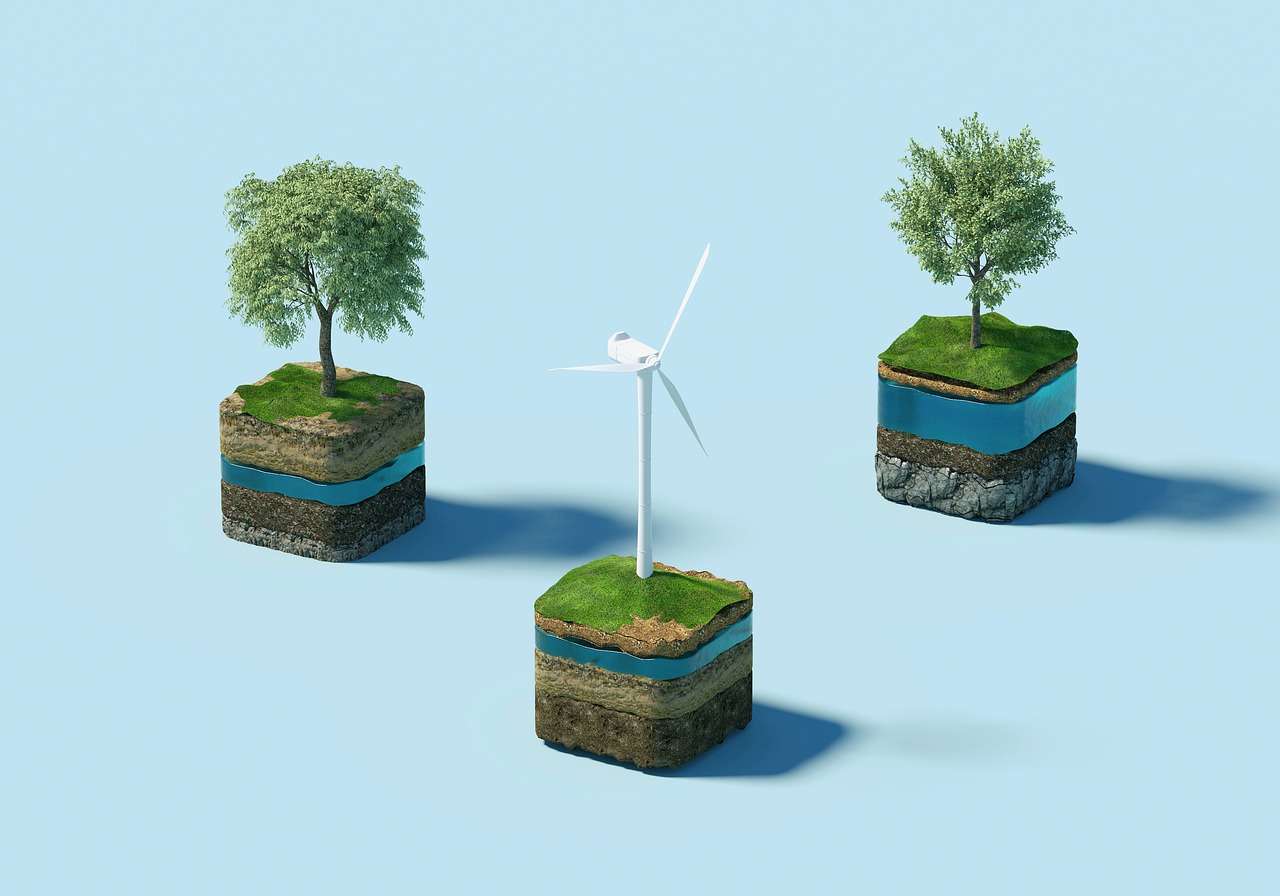
Boats and Water Transportation
Rowboats and Kayaks
Living near bodies of water provides off-gridders with the opportunity to utilize rowboats and kayaks as a means of transportation. Rowboats are propelled by oars or rowing, while kayaks are often paddle-driven, allowing for more maneuverability and exploration in narrow waterways.
Rowboats and kayaks are perfect for off-gridders who have access to lakes, rivers, or coastal areas. They offer a peaceful and environmentally friendly way to navigate the water, whether it’s for commuting, fishing, or simply enjoying the natural surroundings. Owning a rowboat or kayak also eliminates the need for motorized boats, reducing noise pollution and reliance on fossil fuels.
Sailboats
Sailboats harness the power of the wind to navigate through water. They provide off-gridders with a sustainable and romantic mode of transportation for both coastal and inland waterways. Sailing allows for a slower pace of travel, enabling off-gridders to enjoy the journey and connect with nature on a deeper level.
For off-gridders with a passion for sailing, owning or renting a sailboat opens up a world of possibilities. Sailboats can be used for leisurely day trips, exploring new destinations, or even long-distance cruising. With proper training and knowledge of sailing techniques, off-gridders can become self-sufficient sailors, relying on the wind for propulsion and minimizing the need for external power sources.
Electric Boats
Electric boats, also known as electric motorboats or electric pontoons, are gaining popularity as a sustainable alternative to traditional fossil fuel-powered vessels. These boats run entirely on electric power, eliminating the noise, emissions, and maintenance associated with gasoline or diesel engines. Electric boats are propelled by electric motors and are often powered by rechargeable batteries.
For off-gridders living near water bodies, electric boats offer a quiet and eco-friendly way to navigate. They can be used for various purposes, such as leisurely cruises, fishing trips, or transportation between islands or coastal areas. Electric boats are often equipped with solar panels to help recharge the batteries, providing off-gridders with a self-sustaining solution for water transportation.
Solar-powered Boats
Solar-powered boats harness the energy of the sun to generate electric power for propulsion. These boats leverage solar panels to capture sunlight and convert it into electricity, which is used to charge the onboard batteries and power the electric motors. Solar-powered boats offer both a sustainable and continual source of energy, making them highly suitable for off-gridders.
For off-gridders who are passionate about boating and have access to ample sunlight, solar-powered boats provide a self-sufficient and environmentally friendly mode of transportation. They can be used for leisurely cruises, fishing, or even camping on the water. Solar-powered boats also contribute to the preservation of water ecosystems by reducing noise pollution and eliminating emissions.
Horse and Equine Transportation
Horse and Buggy
Horse and buggy transportation harkens back to simpler times when horses were the primary mode of transport. While less common in today’s society, horse and buggy can still be a feasible option for off-gridders living in rural areas with proper training and resources.
For off-gridders with a love for horses and a willingness to embrace a slower pace of travel, horse and buggy transportation can provide a unique and nostalgic experience. With the right equipment and knowledge, off-gridders can train and care for horses to utilize them for transportation purposes. Horse and buggy transportation is not only sustainable but also allows for a closer bond with animals and a deeper connection with nature.
Horseback Riding
Horseback riding offers a versatile and enjoyable means of transportation for off-gridders living in rural areas. In addition to being a recreational activity, horseback riding can be utilized for daily commuting, exploring off-grid trails, or reaching remote locations inaccessible by conventional vehicles.
For off-gridders who enjoy horseback riding, owning or leasing horses allows for a flexible and sustainable mode of transportation. Proper training and knowledge of horsemanship are essential to ensure the safety and well-being of both the rider and the horse. Horseback riding provides off-gridders with a sense of freedom, connecting them with nature and the surrounding environment.
Pack Animals
For off-gridders living in remote areas or rugged terrains, pack animals can be valuable companions and a practical means of transportation. Pack animals, such as donkeys, mules, or llamas, can carry supplies, equipment, or even people on their backs, allowing off-gridders to access areas that are otherwise challenging or inaccessible.
Pack animal transportation requires proper training and care for the animals involved. Off-gridders can learn the skills necessary to handle and care for pack animals, ensuring their well-being and maintaining a healthy bond. Pack animals provide off-gridders with a traditional and self-sufficient mode of transportation, enabling them to venture into the wilderness and carry essential items for their off-grid lifestyle.
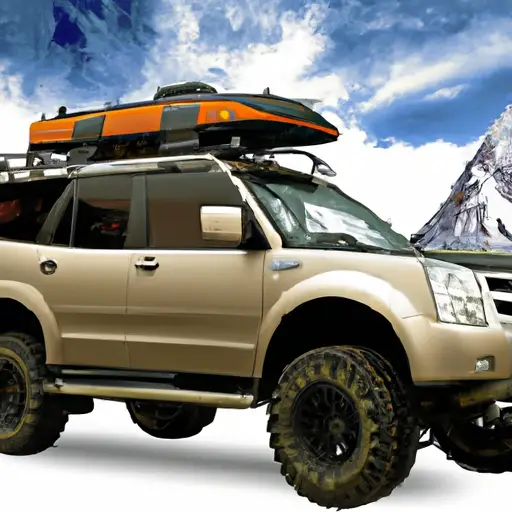
Walking and Hiking
Trail Systems
Walking and hiking are arguably the most natural and sustainable modes of transportation. Off-gridders have the advantage of being immersed in nature, surrounded by vast landscapes and breathtaking trails. By utilizing existing trail systems or creating their own paths, off-gridders can explore their surroundings and reach various destinations on foot.
Off-gridders living in both urban and rural areas can benefit from trail systems nearby. Urban trail systems offer a peaceful escape from the hustle and bustle of the city, allowing off-gridders to connect with nature. Rural trail systems provide opportunities for wildlife observation, fitness activities, and access to remote locations.
Hiking Gear and Equipment
To fully enjoy walking and hiking, off-gridders should invest in appropriate gear and equipment. This includes sturdy hiking boots, weather-appropriate clothing, navigation tools (such as a compass or GPS device), backpacks, and water bottles. The right gear can enhance comfort, safety, and overall enjoyment during walking and hiking adventures.
Off-gridders should also consider carrying essential survival and emergency equipment, such as first aid kits, emergency shelters, and communication devices. Understanding basic wilderness skills, such as map reading, orienteering, and camping techniques, can further enhance off-gridders’ ability to navigate and explore their surroundings on foot.
Navigation Tools
Navigation tools play a vital role in off-gridders’ ability to explore and traverse different terrains and environments. Maps, compasses, and GPS devices can provide crucial information about routes, landmarks, and elevation changes. These tools are essential for planning trips and ensuring off-gridders can safely navigate their surroundings.
For off-gridders living in rural areas, topographic maps can be particularly useful, as they provide detailed information about elevation, terrain, and geographic features. Electronic navigation devices or smartphone apps equipped with GPS capabilities can also assist off-gridders in tracking their routes and recording important waypoints. However, it’s important to have backup navigation methods in case of technology failure or limited battery life.
Off-road Vehicles
All-Terrain Vehicles (ATVs)
All-Terrain Vehicles (ATVs) are off-road vehicles designed to handle various terrains, including rough trails, mud, sand, or snow. They typically have four wheels and are known for their versatility and ability to navigate challenging conditions. ATVs are commonly used for recreational purposes, but they can also serve as a practical mode of transportation for off-gridders in certain situations.
Off-gridders who require a reliable and robust vehicle for accessing remote locations, performing off-grid chores, or transporting supplies may find ATVs to be a suitable option. ATVs can carry cargo on front or rear racks and provide off-gridders with a faster means of transportation on uneven or rugged terrains. However, it’s essential to operate ATVs responsibly and adhere to safety guidelines to prevent accidents or environmental damage.
Dirt Bikes
Dirt bikes are lightweight motorcycles designed for off-road riding and exploring challenging terrains. They feature knobby tires, powerful engines, and suspension systems optimized for rough conditions. Dirt bikes offer off-gridders a thrilling and agile means of transportation for accessing remote areas or enjoying off-grid trails.
For off-gridders who enjoy adventure and require a fast and nimble mode of transportation, dirt bikes can be an excellent choice. Dirt bikes are capable of traversing rough terrains, including dirt trails, gravel roads, or even forest paths. Their compact design and maneuverability allow off-gridders to explore off-grid areas with ease and enjoy the freedom of two-wheeled transportation.
Off-road Trucks and SUVs
Off-road trucks and SUVs are designed to handle rugged terrains and challenging off-road conditions. These vehicles are equipped with features such as four-wheel drive, heightened ground clearance, and robust suspension systems. Off-road trucks and SUVs are commonly used for recreational purposes but can also serve as an essential transportation option for off-gridders.
Off-gridders in rural areas or those who require heavy-duty vehicles for various tasks can benefit from owning off-road trucks or SUVs. These vehicles provide ample cargo space, towing capabilities, and the ability to tackle tough terrains. Off-road trucks and SUVs can be equipped with alternative fuel technologies, such as biodiesel or propane, to promote sustainability and reduce environmental impact.
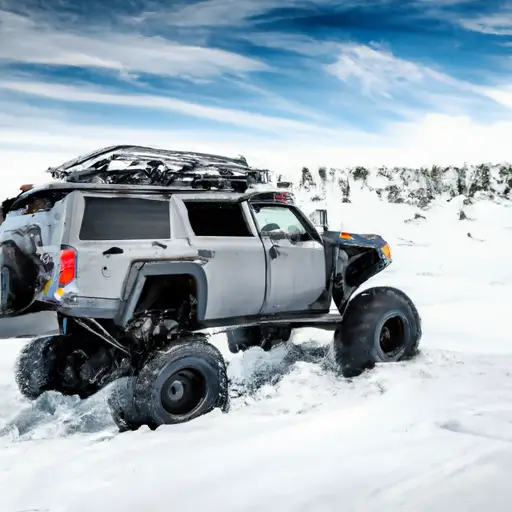
Car Sharing and Carpooling
Ridesharing Apps
Ridesharing apps have revolutionized the way people travel and have become an increasingly popular transportation option in urban areas. These apps connect passengers with drivers who are willing to share their vehicles for a fee. Ridesharing apps provide off-gridders with a convenient and cost-effective alternative to owning a personal vehicle.
For off-gridders in urban areas, utilizing ridesharing apps can be beneficial. It allows them to access transportation when needed without the hassle of owning a car. Ridesharing can also be seen as a more sustainable choice since multiple passengers can share a single vehicle, reducing the number of cars on the road and minimizing congestion and emissions.
Local Carpooling Networks
Local carpooling networks facilitate the sharing of rides among individuals traveling in the same direction. These networks typically operate within specific communities, workplaces, or organizations. Carpooling allows off-gridders to share the costs of transportation and reduce the number of vehicles on the road.
For off-gridders living in rural areas or working in close-knit communities, carpooling networks can be an effective way to share transportation resources. Carpooling helps off-gridders save money on fuel costs and vehicle maintenance, while also reducing traffic congestion and carbon emissions. By coordinating schedules and routes, off-gridders can optimize the efficiency of carpools and establish stronger community connections.
Community-based Car Sharing
Community-based car sharing initiatives offer access to a shared fleet of vehicles within a specific locality. These initiatives are often nonprofit organizations or cooperatives that prioritize sustainability, equity, and community development. Community-based car sharing allows off-gridders to access vehicles without the need for individual ownership.
For off-gridders in urban areas or those living in communities with limited vehicle access, community-based car sharing can be a practical solution. These initiatives promote the efficient use of resources by providing shared vehicles that can be reserved and used when necessary. By replacing multiple private vehicles with a shared fleet, community-based car sharing contributes to the reduction of carbon emissions and fosters a sense of community ownership.
Homemade and DIY Vehicles
Converted Vans and Campers
Converted vans and campers offer off-gridders a unique and self-sufficient option for transportation and accommodation. By retrofitting vans or campers with essential amenities, such as sleeping quarters, cooking facilities, and storage spaces, off-gridders can create a mobile home that meets their specific needs.
For off-gridders who value mobility and flexibility, converted vans and campers provide a versatile means of transportation and a comfortable living space. These vehicles can be customized according to individual preferences, allowing for a self-contained and off-grid lifestyle. With proper planning and design, off-gridders can enjoy the freedom to travel and explore while maintaining a sense of home.
Homemade Electric Vehicles
For off-gridders with a passion for engineering and do-it-yourself projects, homemade electric vehicles (EVs) offer a unique opportunity to combine sustainable transportation with their creative skills. Building a homemade EV involves retrofitting an existing vehicle or constructing a custom vehicle from scratch, using electric motors and rechargeable batteries.
Homemade EVs provide off-gridders with a hands-on approach to sustainable transportation. They allow for customization and tailoring to specific needs, such as incorporating off-grid charging systems or utilizing renewable energy sources. Building a homemade EV requires extensive research, technical knowledge, and adherence to safety regulations. However, it can ultimately result in a truly unique and sustainable vehicle that aligns with off-gridders’ values.
In conclusion, off-gridders have access to a wide range of transportation options that cater to their specific needs and values. From public transportation in urban areas to alternative fuel vehicles, bicycles, motorcycles, boats, and even walking, there are various choices available. By understanding and exploring these options, off-gridders can choose transportation modes that align with their sustainable and self-reliant lifestyles. Whether it’s embracing the simplicity of walking or utilizing advanced technology in electric vehicles, off-gridders have the opportunity to minimize their environmental impact while maintaining their mobility and independence.



